Best Laser Engraver for Metals in 2024

Metal laser engraving has long been pigeonholed as a strictly industrial affair, handled by heavy-duty fiber laser machines. The technology has taken a big leap, and now we have compact metal engravers. These laser engraving machines sit right on your desktops.
Are you in search of one such machine? One that fits neatly into your small business or personal projects like customizing jewelry, business cards, pet tags, or awards? If that’s a yes, then you are in for a treat.
In this article, we are showcasing the two best laser engravers for metals. Not only that, we will also guide you through some key factors to consider when picking out your metal laser engraver.
In This Article
- What Type of Laser Engraver is Best for Metal
- Factors To Consider In Choosing A Metal Laser Engraver
- Best Laser Engraver for Metal
- FAOs on Metal Laser Engravers
- Conclusion
What Type of Laser Engraver is Best for Metal
When it comes to engraving metals, several types of laser engraving machine are available, each differing in terms of laser source, power, wavelength, and other factors. Let's explore the key characteristics of the four main types of laser engraver that can engrave on metal: fiber, CO2, diode, and infrared lasers.
1. Fiber Laser Engravers
Fiber laser engravers are considered the best type of laser engraver for metal engraving due to their high power and ability to create cavities by removing particles from the metal surface. These engravers have a special core that amplifies the laser beams, resulting in a high-energy output. Fiber lasers are designed for various applications, including metal cutting and cleaning.
These machines work at high speeds, quickly engraving different metals, making them suitable for industrial purposes. However, they are not ideal for DIY projects or small businesses due to their size, power, and expense. A fiber laser engraver costs at least $3,000, depending on the optical power, features, and specifications.
2. CO2 Laser Engravers
CO2 laser engravers are a popular choice for various engraving applications, including metal etching. These versatile machines use a carbon dioxide gas mixture, which is electrically stimulated to produce a laser beam. The laser emitted by CO2 laser engravers falls in the infrared spectrum with a wavelength of around 10.6 micrometers, making it suitable for working on non-metallic materials and some coated metals.
In addition to metal etching, CO2 laser engravers can work on various materials, such as wood, acrylic, leather, glass, ceramics, rubber, and certain plastics. This versatility makes them ideal for businesses that require engraving, cutting, or marking on multiple types of materials.
Compared to fiber laser engravers, CO2 laser machines are more affordable, with prices ranging from $3,000 to $5,000. While they may have some limitations in terms of engraving metal, their overall capabilities and cost-effectiveness make them an attractive choice for many users.
3. Diode Laser Engravers
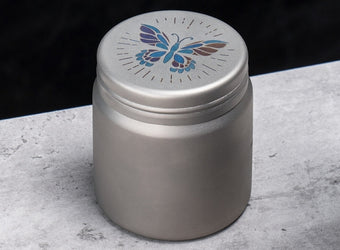
Diode laser engravers can also engrave metal, offering less power than CO2 lasers but still capable of completing the task. Some diode lasers, such as xTool S1, can achieve engraving various colors on metals at different power levels, making metal etching more visually appealing.
These compact, affordable, and beginner-friendly machines are ideal for small businesses, with prices ranging from $500 to $1,200, depending on power, features, and specifications. When purchasing a diode laser for metal etching, choose one with at least 15W of power for faster speeds and better results.
4. Infrared Laser Engravers
Infrared laser engravers operate with a wavelength in the infrared region, making them suitable for certain materials, such as metals and plastics. With a typical wavelength of 1064nm, these lasers are well-absorbed by metal and plastic surfaces, resulting in exceptional engraving results.
Factors To Consider In Choosing A Metal Laser Engraver
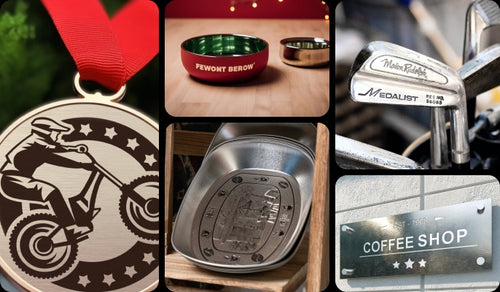
If you’re in search of a metal laser engraver, we recommend careful evaluation of each machine based on these factors:
Laser Type
As previously mentioned, fiber lasers are the first choice for metal engraving on an industrial scale. However, due to their significant price and size, they are not typically found in desktop laser engravers. Whereas, CO2 lasers are effective only on coated metals.
An economical and practical alternative is diode lasers, especially those with infrared beams. These are the best options for desktop metal laser engravers due to their efficiency and size.
Laser Optical Power
Power matters when cutting thickness is involved. However, in the world of engraving, high power is not as critical. For etching metals, an engraver equipped with an optical power ranging from 5W to 10W is usually sufficient. This range provides the necessary energy for clear and precise engravings.
Engraving Speed
For businesses, speed matters the most. Fiber lasers typically have high engraving speeds, often reaching several thousand millimeters per second. In contrast, most diode laser engravers operate at speeds in the hundreds of millimeters per second range, though there are exceptions like the xTool F1.
For enhancing productivity in your workplace, we recommend opting for the highest speed available within your budget and technical requirements.
Work Area
The work area, also known as the processing area or bed size, refers to the internal space of the machine designated for engraving tasks.
Industrial engravers often have much larger bed sizes, but they also require more room. On the other end of the spectrum, desktop engravers offer a decent working area, approximately the size of an A3 sheet. It fits comfortably in most workspaces.
Hand-held laser engravers provide the convenience of portability and on-spot engraving. However, their compact size comes with a reduced working area.
Choose the size that aligns with the space available to you and your project needs.
Precision and Accuracy
Accuracy in laser engraving is a measure of how closely the engraving replicates the actual design. This is largely determined by the laser spot size – the smaller the spot, the more precise the engraving.
Ease of Use
This point is specifically for beginners. When evaluating a machine, consider its ease of use. Are the controls intuitive and user-friendly? Assess the laser control software – is it simple and supportive for new users? Also, consider its compatibility with different operating systems. Opt for a machine that automates tasks and requires minimal user input.
Add-Ons
Engraving isn't always about flat surfaces or objects that fit neatly within a machine’s case. For versatility, check if the machine supports various add-ons and accessories. For example, if you are interested in rotary engraving, ensure the machine offers support for it.
Look for features like a pass-through slot, which extends the machine’s workspace, and risers for accommodating thicker objects. These additions can significantly expand the range of projects you can undertake.
Safety
Safety features should never be an afterthought. Preferably choose laser machines with an enclosed lid and a laser-filtering cover. Ideally, machines equipped with smart sensors for fire detection, automatic shut-off when the lid is opened, and emergency stop buttons are desirable. For the utmost safety, choose class 1 laser engravers as they adhere to the highest safety standards.
Best Laser Engraver for Metal
Now, let’s unveil the best laser engravers for metals. We have two names: one is a compact, portable laser engraver, xTool F1 and the other one is an enclosed powerful laser, xTool S1.
xTool F1: Best Portable Laser Engraver for Metals
Meet the xTool F1, a standout portable laser engraver. This machine’s hand-held design makes operation a breeze, and its lightweight build, just 4.6 kg, ensures portability. It’s an ideal choice for craft fairs and on-the-go projects.
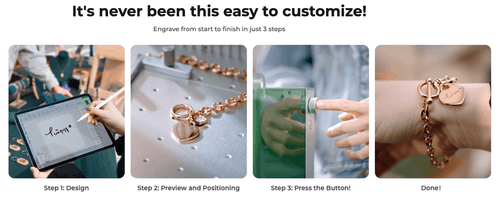
Speed is F1’s key highlight as hidden in the name. It’s the quickest diode laser engraver on the market with an engraving speed of 4000 mm/s– comparable to what we see in industrial fiber lasers. Engraving a business card? Just seconds!
What makes it best for metal engraving is its switchable dual-laser technology: a 10W diode laser, and a 2W IR laser beam. The duo makes it capable of engraving about 300 materials, including cardboard, wood, leather, glass, acrylic, and rubber. The IR module is particularly placed for plastics and metals. It does support the color laser engraving on metals.
Precision is another hallmark, thanks to its galvo-technology. It achieves motion accuracy of 0.0019mm, and f-theta lenses add unparalleled detail to your designs.
The internal work area is 115 by 115 mm, perfect for small jewelry and tags. Need more space? It expands up to 415 mm with an extension kit.
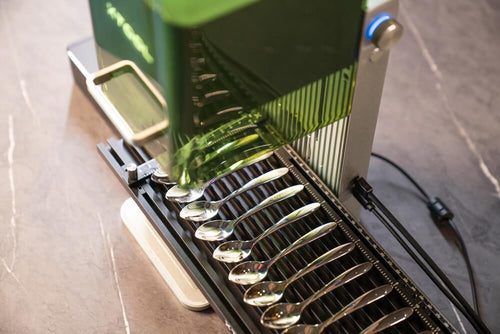
Safety is well-covered with its enclosed design and laser filtering lid, which contains lasers and harmful gases. An integrated exhaust fan removes fumes efficiently.
For those looking to maximize their engraving potential, xTool F1 offers add-ons like a rotary attachment for cylindrical objects, a smoke purifier for cleaning exhaust, and a slide extension kit for workspace expansion.
xTool S1: Best Enclosed Diode Laser Engraver for Metal
Meet xTool S1, the latest laser cutting and engraving machine in the xTool lineup. It is the world’s first enclosed 40W diode laser. Safety is reflected in the name as well (Safety First); it is a class 1 laser-certified product.
To achieve that standard it comes with multiple safety features, like the laser filtering lid, an emergency shut-off button, and enhanced 5-direction flame detection sensors.
What makes it further unique is the switchable laser modules. It comes in 40W and 20W diodes for laser-cutting jobs. And a dedicated 2W 1064nm IR module, especially for engraving metal.
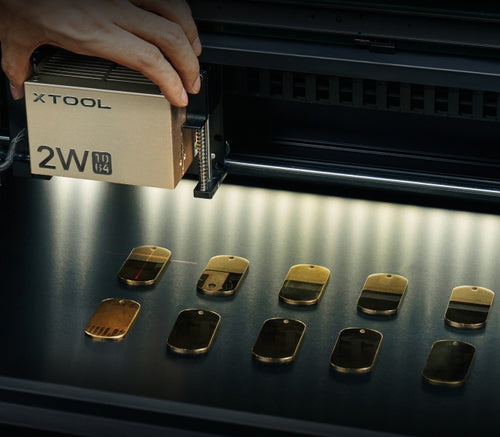
Moving beyond its predecessor, the D1 Pro, the S1's fully enclosed design provides unmatched stability, maintaining its composure even at 600 mm/s.
The machine is also packed with some all-new features. The first one is the ‘pin-point positioning system’ that lets you mark points on the material and work within that range.
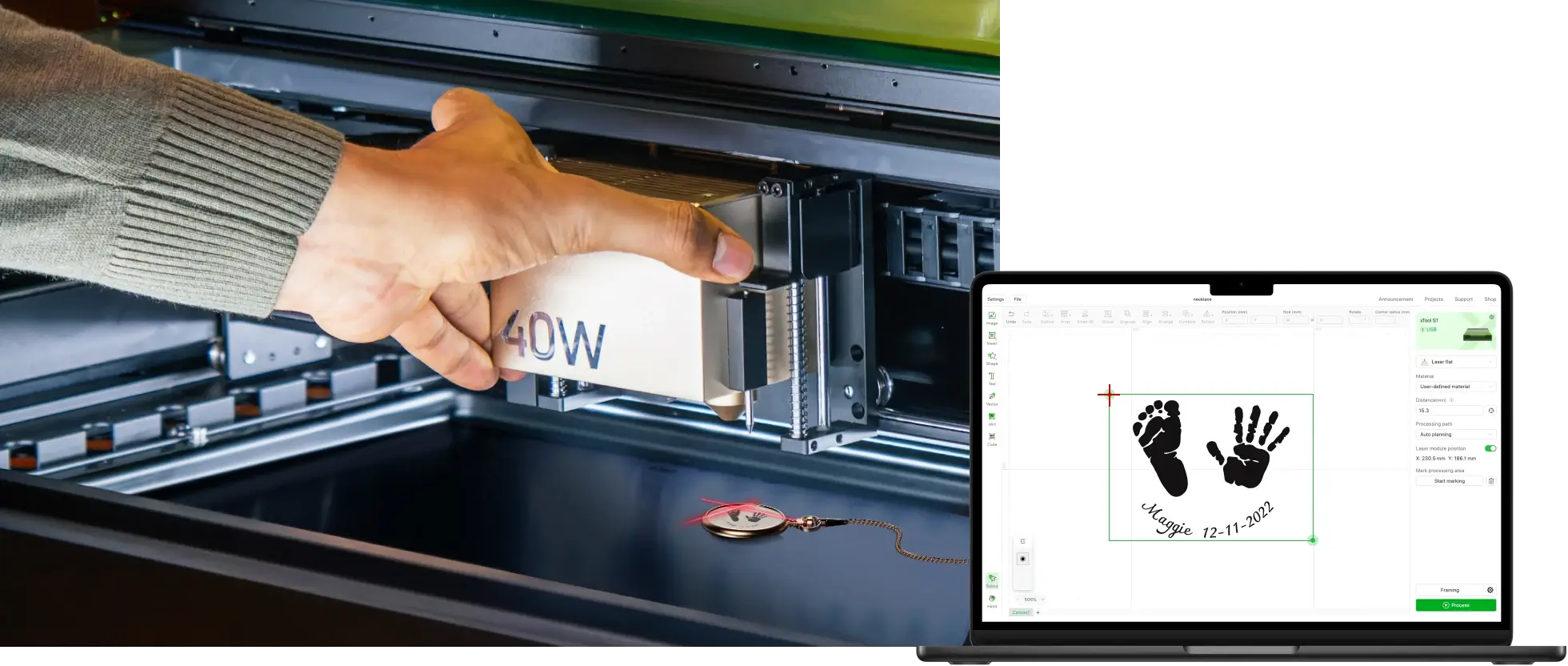
It steps up the engraving game with a smart auto-focus system that sharpens cutting by adjusting the laser precisely. It’s also a pro at handling uneven surfaces, thanks to what we call 'dynamic focus engraving.' Its dynamic z-axis adjusts the laser in real-time for consistently perfect engravings.
Working with long metal sheets? Easy. This means you can tackle bigger projects with precision and ease.
Engraving on stainless steel tumblers and metallic rings becomes effortless with the support of our rotary attachment, RA2 Pro. And for those who use LightBurn software, the xTool S1 seamlessly integrates into your existing workflow.

FAQs on Metal Laser Engravers
What Type of Laser is Best for Metal Engraving?
For professional, deep metal engraving, fiber lasers are the industry standard. They are high-powered and emit wavelengths that are efficient for metal absorption. This makes them the best choice for serious metal engraving tasks.
Can a Diode Laser Engrave Metal?
Yes, a diode laser, especially the infrared (IR) laser, is quite effective for metal engraving. With a wavelength of 1064 nm, it is readily absorbed by metals, which leads to excellent engraving results.
Can a CO2 Laser Engrave Metal?
CO2 lasers may be used for engraving coated metallic pieces. For bare metals, the CO2 laser’s beam tends to bounce off due to its wavelength, making it less ideal for direct metal engraving.
What Is the Cheapest Laser Engraving Machine for Metal?
A diode laser is the cheapest option for metal engraving. To be specific, xTool’s D1 Pro (10W) costs under $600. It is the best entry-level laser engraver to start metal engraving.
What Is the Most Expensive Laser Engraving Machine for Metal?
On the high end of the spectrum, fiber laser machines are the most expensive metal laser engraver, typically found in industrial settings. Their price ranges from tens to hundreds of thousands of dollars.
How Much Power a Laser Engraver is Needed for Metal Engraving?
Laser engravers need to have both power and favorable wavelength for engraving metals. For instance, a 2W IR laser can easily engraver metals. For personal or at-home projects, laser engravers with power ranging from 5W to 20W are sufficient to achieve good results on metals.
Conclusion
Metal laser engraving is now accessible to everyone, whether it’s a small business or hobbyist. There are machines to fulfill everyone’s needs.
If you’re in the market for a compact metal laser engraver, the xTool F1 stands unparalleled in its category. For small businesses focused on batch production, xTool S1 is the safest and most powerful diode metal engraver.
Related Articles

Best Laser Engraver for Metals in 2024

Metal Engraving Tools: How to Choose Your Right One

